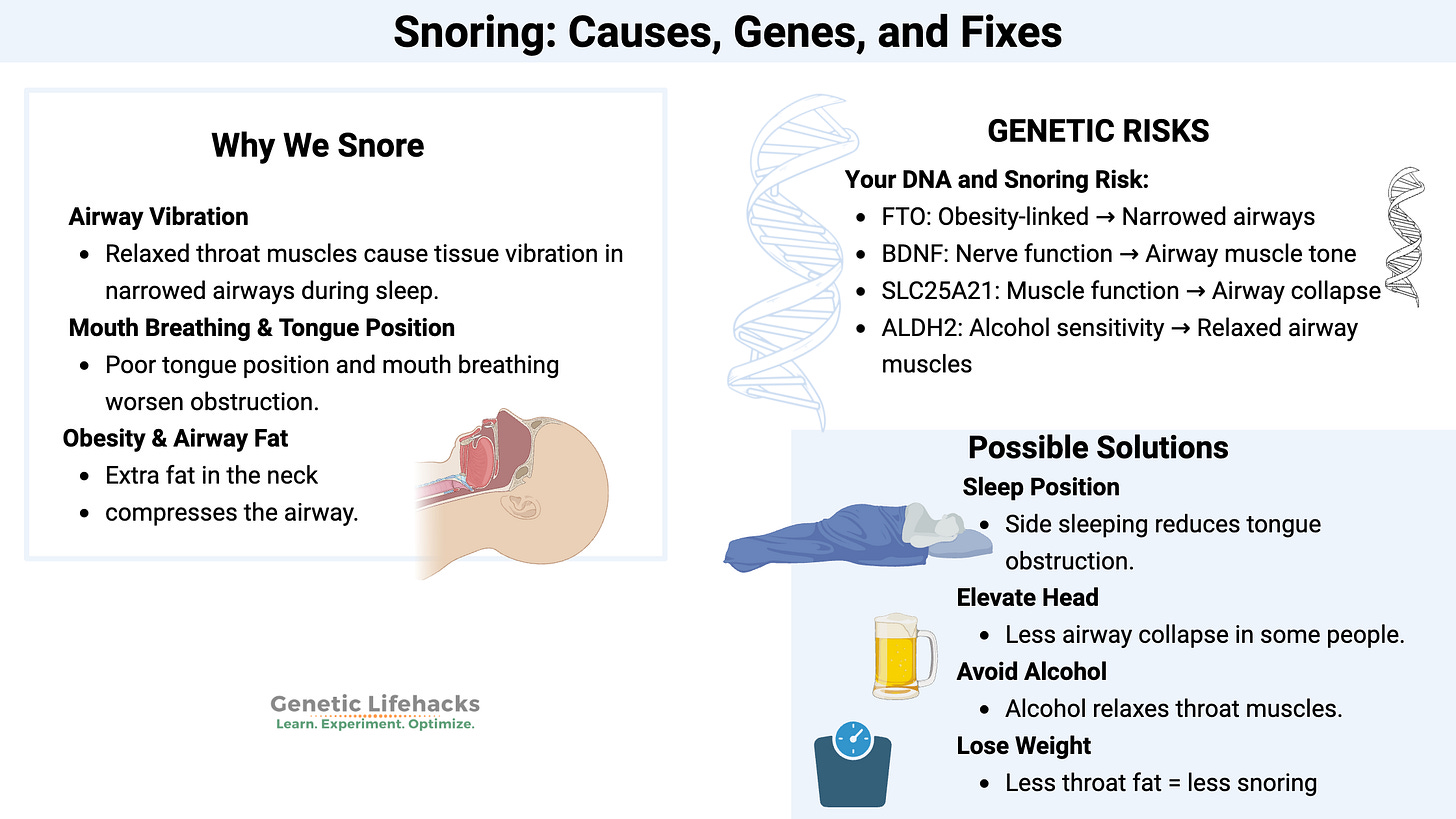Did you know that humans can go much longer without food than we can without sleep? Sleep is essential, and good sleep is priceless.
I'm kicking off a two-week-long focus on sleep with a new article on snoring. Genetics comes into play with some factors in snoring, but lifestyle factors are also likely involved.
Here are three sleep tidbits:
1. Our modern world is filled with blue light at night, which impacts sleep quality and quantity by disturbing circadian rhythm and melatonin production.[ref] One solution is to turn off all electronics (TV, phone, tablet) a couple of hours before bed. If you can't live without your iPhone/iPad at night, you can avoid the blue light from the phone by switching it entirely to red. Here's how to set up a red shift on an iPhone or iPad.
2. Another sleep tip is that light coming through your windows from streetlights and cars can also affect your sleep quality and even increase the risk of depression. The solution? Get some good blackout curtains or shades. Or a sleep mask.
Here's why: Dim light at night impacts sleep structure. A study in younger adults found that sleeping while exposed to dim light at night "increases the frequency of arousals, amount of shallow sleep and amount of REM sleep." The amount of dim light used in the study (5 or 10 lux) is similar to what you get from streetlights or a nightlight.
3. In a new study published in Cell, the researchers found that slow oscillation in norepinephrine during non-REM sleep causes the movement in the glymphatic system. The glymphatic system uses cerebrospinal fluid to flush out waste during sleep - specifically during non-REM slow-wave sleep. It's like it's gently washing out your brain at night, driven by rhythms of norepinephrine, which dilates vessels. Glymphatic function is important for preventing neurodegenerative diseases and is a target for some interesting studies right now.[ref][ref]
The interesting tidbit mentioned in the Cell study is that the sleep medication zolpidem (Ambien) suppressed the norepinephrine rhythm and glymphatic brain waste clearance.
Next week: A deep dive into circadian rhythm genes.
BTW - If you are wanting to pick up an AncestryDNA data file to add to your 23andMe or MyHeritage data, Ancestry is on sale right now for $39 for Mother's Day. Here's how to combine two data files for use on Genetic Lifehacks.
All the best,
~ Debbie
Snoring: Genes and Solutions
Key takeaways:
~ Snoring is caused by relaxed throat muscles narrowing the airway and vibrating during sleep.
~ Genetics play a role—certain genes affect airway structure, fat distribution, and muscle control.
~ Snoring doesn't always mean sleep apnea, and loudness isn't linked to severity.
~ Lifestyle changes like side-sleeping, weight loss, and avoiding alcohol can help to reduce snoring.
What I've been reading:
1. Parkinson's risk and ultraprocessed foods:
A new study in the journal Neurology looked at whether eating a lot of ultraprocessed foods —like chips, sugary drinks, and ready-to-eat meals—is linked to early signs of Parkinson’s disease. Researchers followed over 42,000 people from two large health studies who didn’t have PD. They tracked their diets over two decades and then looked at nonmotor symptoms often seen before PD, like constipation, sleep issues, reduced sense of smell, depression, and fatigue.
The results showed that those in the highest UPF consumption group were over twice as likely to show three or more of the early Parkinson's symptoms.
2. Genetic variants related to ME/CFS
This new preprint explains a machine learning model to identify rare loss-of-function mutations that could be involved in ME/CFS. They also looked at genes that are differentially expressed in people with ME/CFS.
3. Cooking methods and microplastics in fish
This study, published in ACS, looked at the effect of boiling, steaming, or frying fish on the number of microplastic particles in the meal. There were a lot of microplastic particles in the fish (from China) before cooking. Frying the fish at high heat increased the overall number of microplastic particles -- causing larger microplastic particles to fragment into multiple nanoplastic particles.
4. Zolpidem use and Alzheimer's risk
While not a new study, I found it interesting that using more of the sleep medication was associated with a much higher risk of Alzheimer's. However, it was just an epidemiological study and not designed to show causation.






Oh my gosh! Thanks for the tip on turning the blue light to red! I cannot hold a book due to having broken my neck years ago and have to read on my iPad. My body is much wearier at night than my mind, so I read to get sleepy.